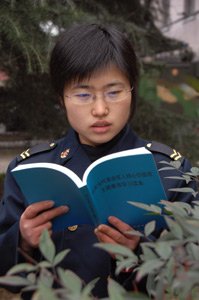PLA zeroes in on college hiring
Updated: 2011-12-22 09:13
By Zhao Shengnan and Li Xiaokun (China Daily)
|
|||||||||
|
 Jia Na, 25 and a 2007-09 veteran of the PLA, is a defense cadet at Tsinghua University. She will return to the army after she earns her bachelor's degree in journalism. [Provided to China Daily] |
College recruits also can help fill education gaps among their comrades-in-arms. Jia, for example, taught English to one of her colleagues for six months.
Jia, who is now 25, enlisted in 2007 and completed her service in 2009. She was the champion in a telegraphy competition at her military base, becoming the first voluntary soldier to acquire third-class merits for the squadron she served.
In 2010, she started studying for a bachelor's degree in journalism at Tsinghua University as a defense cadet. She will return to the PLA after graduation.
Expectations
Li Yueyue, who is just starting his military service, is hopeful about what the mysterious military life can bring to him. "I am not good at tackling pressure now and spent most of my spare time (at college) in the dorm. So I hope the army can make me more strong-minded and optimistic."
There is more that's available. According to a statement from the Chinese National Defense Ministry, college students who enlist for service may resume their studies within two years of leaving the military. The ministry also decided to pay up to 6,000 yuan ($944) a year to college recruits, when they complete their service, to help them with their education.
For example, a recruit who joins the army after two years of college can be paid 12,000 yuan (6,000 for each year of schooling) upon completing military service. A recruit who signs up after college graduation can be paid 24,000.
The ministry also stated that college recruits with outstanding performance in the army may be directly promoted to active-duty officer posts after they complete their two years of training.
Addressing the post-discharge arrangement policy, the Beijing Recruitment Office said college recruits will enjoy "preferential treatment" when applying for jobs at State-owned enterprises, government-sponsored institutions and in civil service. Such jobs are increasingly sought-after because of their stability and generous benefits, including a highly coveted Beijing residence permit. Specific policies covering residence permits in other provinces haven't been developed.











